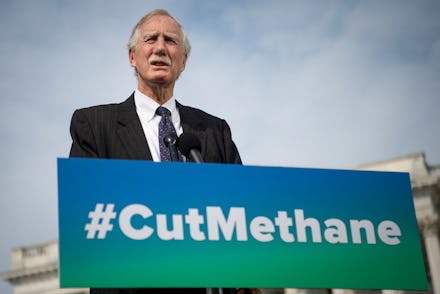The U.N. says we’re screwed if we don’t cut methane emissions

Much of the conversation about combatting climate change centers around cutting carbon emissions — but that's not the only greenhouse gas affecting the planet. While it's less talked about, methane is particularly potent, and it has reached record levels of emissions in recent years. A soon-to-be released report from the United Nations warns that we must drastically and rapidly reduce our methane use if we stand a chance of keeping the planet from warming more than 1.5 degrees Celsius above pre-industrial levels — the official target of the Paris Agreement.
A summary of the report, which was reviewed by The New York Times, found that human-caused methane emissions need to be cut by up to 45%, or 180 million metric tons, by 2030. Accomplishing that reduction in emissions could thwart an expected 0.3 degree Celsius increase in global temperature.
Methane isn't as plentiful as carbon dioxide in the atmosphere — according to the Environmental Protection Agency, it accounts for just 10% of total greenhouse gas emissions — and doesn't hang around for as much time, but it's far more potent. According to NASA, methane traps heat 28 times more effectively than carbon dioxide does over a 100-year period and is 80 times more potent during the first two decades after release. Per the Environmental Defense Fund, this one gas is believed to be responsible for at least 23% of the planet's warming — so it makes sense that experts are sounding the alarm on reducing its release.
In the last few decades, much of the rise in methane levels has come from the energy sector — particularly fossil fuel extraction, according to Nature. This has likely been exacerbated over the last four years, as the Trump Administration made concerted efforts to roll back environmental regulations that restricted the amount of methane emissions permitted by gas and oil companies. According to data from the latest U.N. assessment published by Reuters, the fossil fuel industry accounts for 35% of all human-caused methane emissions and could stand to weather the largest reduction by the end of the decade.
While a good chunk of reducing methane emissions — and carbon emissions, for that matter — amounts to a mission to stop burning so much goddamn gas, cut backs can happen in other areas, too. For instance: cow burps. According to the U.N., the agriculture industry contributes about 40% of total methane emissions — and cows, with their methane-heavy belches, and other livestock responsible for much of it, according to the U.N.'s Food and Agriculture Organization. Reducing consumption of red meat and dairy products, or finding alternatives like lab-grown meat, would go a long way to cut down on the methane emissions produced by gassy cattle.
And then there are the landfills. As our trash (specifically organic material) decomposes, it releases a byproduct known as landfill gas. According to the EPA, that gas is made of up about 50% methane and 50% carbon dioxide. Nearly 20% of our total methane emissions come from landfills, according to U.N. data published by Reuters.
The fact that methane emissions are on the rise isn't new information. We've long known about this — and we also have a pretty good idea that current figures likely vastly underestimate the amount of emissions we've been pumping into the atmosphere. But the new U.N. report makes it clear that it's time to do away with any ambiguity on the matter: Methane is a major problem, and curbing it is essential to combating climate change.